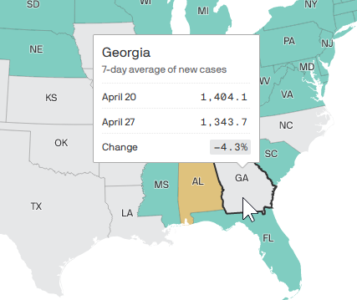Trip-free psychedelics, avocados fight cancer, Neanderthal plagues, and more
30 Apr 2021
Posted by Andrew Kantor
Yes, blood type can make a difference
Swedish researchers were curious about the whole ‘blood-type susceptibility’ thing — are people with different blood types really more or less susceptible to certain diseases?
So they did what researchers do: They looked at medical records for more than five million people and more than 1,000 diseases to see if there were any connections.
You betcha there were. They found 49 conditions that were linked to blood type (A, B, AB, or O), plus one linked to the Rh factor. They include blood clots, bleeding disorders, kidney stones, and more. And the Rh connection? “[W]omen who were RhD-positive were more likely to experience pregnancy-induced hypertension.”
You need to sign up and be ready to immunize
We’ll be blunt: We may have to cancel our June 20 immunization course* on Amelia Island because not enough of you are registered.
Whether it’s the seasonal flu, a Covid booster, or something in between, you need to be immunizing your patients — and APhA’s course is the best there is.
And you know that the Georgia Pharmacy Convention is the biggest event of the year for Georgia pharmacists!
So…
- Register for the convention.
- Sign up for “APhA’s Pharmacy-Based Immunization Delivery: A Certificate Program for Pharmacists” on June 20. It’s a separate registration from the convention, and yes, it’s really in danger of being cancelled. So if you’re planning on it but got distracted, focus and register before it’s too late!
Covid pill is on its way
Pfizer says its oral treatment for Covid-19 could be available by the end of the year. It’s a protease inhibitor designed to prevent the SARS-CoV-2 virus from replicating, so it needs to be given at the first sign of infection.
Right now the only actual treatment for Covid-19 is remdesivir; everything else just alleviates symptoms.
Bonus: Article includes the phrase “game-changer”!
Avocados vs leukemia
Leukemia cells rely on an enzyme called VLCAD to survive. So to treat it, attack the enzyme, right? Canadian researchers figured that too, and they started searching for any compound that might inhibit VLCAD.
“Lo and behold, the best one was derived from avocado.”
It’s called avocatin B, it’s found only in avocados, and it’s well-tolerated by humans — especially hipsters who insist on putting it on their toast.
Next up: Possible clinical trials to take the research out of the lab.
Long Covid guidance coming soon
The CDC will soon offer guidance on diagnosing and treating long Covid. That is all.
Psychedelics: This trip is a staycation
You’ve hopefully seen the stories of how psychedelic drugs — looking at you, psilocybin — seem to be effective at treating serious depression. Of course, there are side effects that some people might find mild or interesting, but others would consider purple monkey dishwasher.
Now researchers at UC Davis have a middle ground: a “psychedelic-like drug that doesn’t cause hallucinations.” Called AAZ-A-154, it’s similar to the more … interesting hallucinogenics, but it doesn’t bind to the receptor that causes the gopher’s rainbow bicycle to pedal backward through the ceiling.
When this compound was administered to mice, it produced antidepressant-like effects within 30 minutes and failed to cause any head-twitches, an indicator in mice suggesting the compound would cause hallucinations in humans. Even at relatively high doses, the results appeared to be the same, with cognitive benefits lasting for over a week.
Infections love processed food
The good news about processed food: Low risk of E. coli infection. The bad news, found Georgia State researchers, is that they might “increase the incidence of diseases characterized by low-grade chronic infection and inflammation such as diabetes.”
Essentially, the Western, Twinkie-based diet, being low in fiber, isn’t good for certain gut bacteria — and it’s those bacteria that help clear out certain infections.
Mice fed the Western-style diet were frequently unable to clear the pathogen Citrobacter rodentium from the colon. They were also prone to developing chronic infection when re-challenged by this pathogen.
You can turn their research around, of course, and realize that it may be possible to treat chronic infections by a change in diet.
A couple of Covid updates
Cases are falling in most states, including Georgia. (But not Alabama, which is seeing a jump of more than 17 percent week to week — mostly because the numbers are low enough that a few dozen more is a huge percentage jump.)

Meanwhile, real-world data finds the Pfizer and Moderna vaccines are 94 percent effective in keeping older folks out of hospital (presumably by keeping them from being very ill).
The Long(ish) Read: Ancient bacteria
In a rare positive article, the Atlantic looks at how much we’re learning from ancient DNA in “A Revolution Is Sweeping the Science of Ancient Diseases”.
If you know exactly how and where to look, you can also find DNA from ancient pathogens in old bones. The “junk” might actually contain clues about long-ago pandemics. Over the past decade, scientists have used ancient DNA to study diseases including the plague, syphilis, hepatitis B, and a mysterious “cocoliztli” epidemic—all using techniques honed through decoding the Neanderthal genome.


